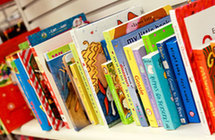儿童节特供:11本最伟大的英文童书
|
什么样的书才能称得上最伟大的儿童书呢?英国广播公司(BBC)文化频道的编辑采访了几十位世界各地的书评人和童书编辑,让他们列出自己心目中针对10岁以下儿童最好的英文儿童读物。这些评论人士和编辑一共列出了151本书,而下面的这11本在他们的推荐中多次出现。我们相信,这些书还会继续陪伴一代又一代儿童成长。
11. Laura Ingalls Wilder, Little House on the Prairie (1935) Wilder’s nine classic frontier novels were inspired by her own 19th Century childhood. She was raised in a pioneer family, and traveled through the Midwest by covered wagon. Wilder writes with authentic detail of a little girl living “in the Big Woods of Wisconsin, in a little gray house made of logs" with her parents, two sisters and their dog, Jack. "As far as a man could go to the north in a day, or a week, or a whole month, there was nothing but woods. There were no houses.” Wilder’s accounts have made daily life on the frontier vivid for generations. (Credit: Harper) 10. Madeleine L’Engle, A Wrinkle In Time (1962)
Meg Murry’s father, a time traveling physicist, has disappeared. One night she, her precocious younger brother Charles Wallace and her mother – “a scientist and a beauty as well” – have an unexpected visitor. "Wild nights are my glory," the strange Mrs Whatsit tells them. "I just got blown off course.” She refers to a tesseract, a fifth dimension that allows travel through time and space. With her brother and a high school friend, Calvin, Meg sets out across the universe to find her father. Their confrontation with IT, the disembodied conformist intelligence that casts a shadow over the universe, is a noirish Cold War touch. L’Engle’s Newbery Award-winning book was an early foray into science fiction for younger readers, inspired in part by Einstein’s theory of relativity. Meg was a first in literature: a nerdy girl whose intelligence was matched by her powerful love for her family. (Credit: Farrar, Straus & Giroux) 9. Ursula K Le Guin, A Wizard of Earthsea (1968)
A young boy known as Sparrowhawk saves his village with a smattering of magic he learned from his aunt, a local witch. Apprenticed to the mage Ogion the Silent, and renamed Ged, he begins his training as a sorcerer. Le Guin’s exploration of the consequences of Ged’s misfires and temptations while at a school for wizards, his struggles with dragons and his inner demons, reshaped fantasy storytelling’s concepts of good and evil. Gradually, Ged gains wisdom as he faces his challenges. "He knew now, and the knowledge was hard, that his task had never been to undo what he had done, but to finish what he had begun." "To me Le Guin’s story is about learning your craft as a writer, the long and painful struggle for mastery of both your art and yourself, written in astounding prose," says Amanda Craig, author and reviewer for the New Statesman and the Daily Telegraph. (Credit: Parnassus Press) 8. Roald Dahl, Charlie and the Chocolate Factory (1964)
The critics’ poll nominated five of Roald Dahl’s children’s books – the most by any author. Poet and book critic Tess Taylor calls his work “rollicking, funny, scary, humane and magical.” New York Times columnist Carmela Ciuraru says, “It seems impossible to choose just one favourite by Dahl, arguably the greatest children's book author of all time, but he is at his most delightful, imaginative and mischievous in this 1964 classic.” Dahl’s most popular among the five nominated is the story of Charlie Bucket, his Grandpa Joe, the Oompa-Loompas and the five golden tickets that take Charlie inside the factory of Willy Wonka, “the most amazing, the most fantastic, the most extraordinary chocolate maker the world has ever seen!” “Something crazy is going to happen now, Charlie thought. But he wasn’t frightened. He wasn’t even nervous. He was just terrifically excited.” (Credit: Penguin Books) 7. AA Milne, Winnie-the-Pooh (1926)
Milne named the characters in his classic children’s book after his own son Christopher Robin, his cuddly teddy bear, his stuffed animals Piglet, Tigger, the donkey Eeyore and others. Christopher and Pooh wander through the Hundred Acre Wood not unlike the forest near Milne’s home in East Sussex. His first adventure sends him up a tree buzzing with bees, singing a little song to himself: “Isn’t it funny how a bear likes honey…” And the adventures continue, narrated with sweet grace by a father who includes his son and his son’s world in every new plot twist. A playwright and contributor to Punch, Milne will be forever known as the creator of the perfect read-aloud nursery tale. (Credit: Dutton Books) |









